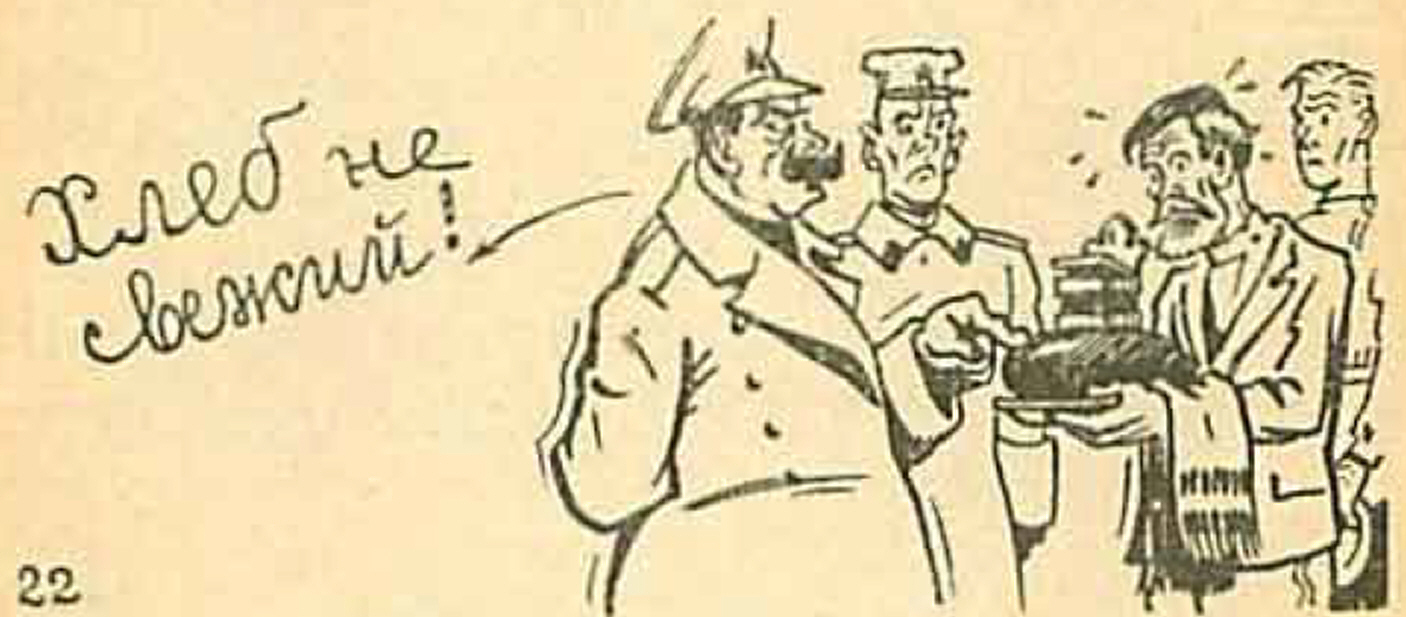

|
Languages |
| Russian for English speakers 22 |
  |
| Lesson 22 |
|
Russian |
English Английский |
|
|
62 - шестьдесят два |
sixty two |
|
|
63 - шестьдесят три |
sixty three |
|
|
64 - шестьдесят четыре |
sixty four |
|
|
65 - шестьдесят пять |
sixty five |
|
|
Двадцать второй (22-й) урок |
Twenty second lesson |
|
|
УРОК НОМЕР ДВАДЦАТЬ ДВА (№22) |
Lesson number twenty two (#22) |
|
| Чорт знает... |
The devil knows |
|
| Чёрт его знает... |
AK: Use this phrase (lit. "devil it/him knows")
|
|
| 1 | Анна, скажите мне, чего недостаёт к обеду? (1) |
Anna, tell (pl.) me |
| 2 |
Кухня грязная, Пётр Маркович,
|
The kitchen is dirty, Peter Markovitch, |
| 3 |
Какое там мыло! |
What's that about soap [What there soap]! |
|
AK: Word by word "What there's soap!". |
||
|
Какое к чёрту мыло! |
lit. "What, to the devil, a soap", meaning "To the devil with the soap' |
|
| Говорю об обеде (3), а вы мне о кухне! | I speak about the dinner and you (answer) about the kitchen! | |
|
AK: before а coma is a must, since it joins two sentences. |
||
| 4 |
Хлеб не свежий (4) |
The bread is not new [fresh] |
|
AK: "фунты"
реально не используются больше в России. |
||
| 5 | Салат у нас есть конечно... | Lettuce we have certainly... |
| сколько дать вам денег, Анна? |
how much money (must I) give you, |
|
|
AK: meaning is "how much money do you need?" |
||
| 6 | Платить булочнику (5) нужно сейчас, |
Paying [to] the baker is necessary at once (now), |
| AK: meaning is "You/I must pay to the backer at once" | ||
| 7 | а мясник, иногда любезный, |
as for [but] the butcher, (he is) sometimes kind (amiable). |
| 8 | иногда чорт знает какой... | sometimes the devil knows how [what]. |
| AK: lit. "sometimes, devil knows /what kind of/" | ||
| 9 | Сколько стоит прованское масло и уксус? |
How much costs olive [Provençal] oil and vinegar? |
| 10 | У нас есть достаточно... | We have [with us there-is] sufficiently. |
| Сегодня надо ещё... | To-day, we must [(it is) necessary) also... | |
|
AK: meaning is "today we also need..." |
||
| 11 | Купите, чего недостаёт... | Buy [of] what is-wanting. |
|
AK: lit. "buy, what lacks" |
||
| 12 |
остаётся ; сколько стоит ? иногда |
(There) remains; how much costs?; sometimes. |
| 13 |
достаточно; недостаёт; чёрт (чорт). |
Sufficiently; there-is-lack; devil. |
|
AK: недостаёт means "it is lacking of (to something or to someone)" |
||
| 14 | грязный; купить; платить. | Dirty; to buy; to pay. |
|
AK: купить
refers to the future: |
||
|
УПРАЖНЕНИЕ |
EXERCISE. | |
| 1 |
У меня недостаточно денег,
|
I have not-enough money in order to buy [of] what I lack [there-is-want]. |
| 2 | Сколько у вас денег? | How-much money have you [have you of money|? |
|
AK: Word by word "how much at/on you money?" |
||
| 3 | Я сейчас не хочу вам платить. | I will not pay you at once. |
|
AK: This means "I don't want to pay you right now". |
||
| 4 | Чорт знает что такое (6). | The devil knows what it is [what such] ! |
| AK: This means "It's a total mess." | ||
|
|
||
| 5 | Этот стол грязный; эта комната грязная; это пальто грязное. |
This table is dirty (masculine); |
| NOTES. | |
| 1 |
After the preposition к (or
ко), which means towards, for,
the dative is always used. |
| 2 |
Мыло [мыла],
soap, is one of the difficult words to pronounce well for a
foreigner. |
| 3 |
Об обеде
- about a diner |
| 4 |
Свежий
(fresh), an adjective with a soft ending, like
|
| 5 |
Булочник, a baker; булочнику, to or for the baker, dative case. |
| 6 |
Exercise, paragraph 4 : |
|
Tweested English Section |